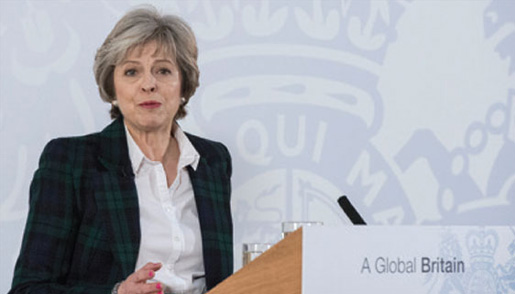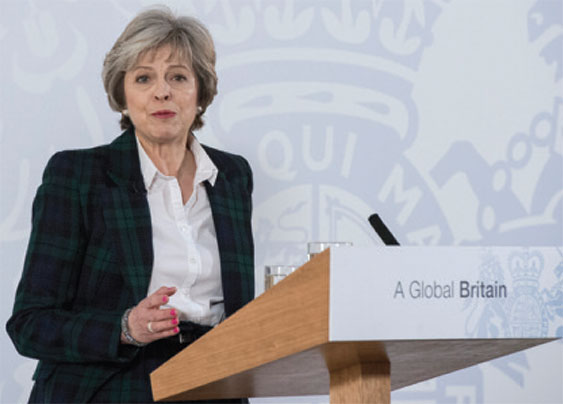‘Clean’ Brexit doesn’t wash


Following approval of the Bill giving power to Theresa May to trigger Article 50, the UK appears destined to follow through on a hard Brexit.
The two-clause bill, containing a total of just 137 words, came just days after the Supreme Court ruled that the triggering of Article 50 could not be done without parliamentary approval.
Intentionally minimalistic to avoid amendments, the European Union (Notification of Withdrawal) Bill outlines that it aims to “confer power on the Prime Minister to notify, under article 50(2) of the treaty on European Union, the United Kingdom’s intention to withdraw from the EU.” The power would have effect “despite any provision made by or under the European Communities Act 1972 or under the European Communities Act 1972 or any other enactment”.
Despite objections to MPs being given just five days to debate and scrutinise the measure, most MPs, including Labour leader Jeremy Corbyn, supported the bill.
Theresa May has confirmed that the UK will be leaving the Single Market, meaning the hard Brexit (dubbed clean Brexit by supporters), that many, especially in Northern Ireland and Scotland, had feared, will become a reality. May promised to push for the “freest possible trade” with European countries but the government have repeatedly said that publishing their Brexit plan would give the EU an unfair advantage when negations begin post-Article 50 triggering.
Considering that the European’s lead negotiator has stressed that there will be no “cherry-picking” by the UK in the negotiations, it would appear that Theresa May has opted for what Professor of European Politics at Queen’s University Belfast, David Phinnemore, describes as the World Trade Organisation (WTO) option. Leaving the single market and the customs union will allow the UK to make free trade deals with non-EU member states, however its access to the EU-27 will be subject to tariffs and quotas and non-tariff barriers (meaning a form of border control for Ireland) will also be applicable. The move will also inhibit the UK from concluding preferential trade agreements with individual EU member states, rather would requiring a deal with the EU-27 as a whole. This would make a special deal between the UK and Ireland very unlikely. The WTO option will also mean no free movement of services, capital or people.
The other option that was available to May, outlined by Phinnemore, was retention of membership in the customs union. This would have allowed for most goods to be exported to and imported from the EU tariff and quota free, however, it would not entail participation in the Common Agricultural Policy and so necessitates separate negotiations for agricultural products. It would have also required the UK to align with the EU’s common commercial policy, meaning that the UK would not be free to create free trade agreements with non-EU member states that did not align themselves with the EU-27. The customs union does not cover trade in services or free movement of people meaning immigration controls would still be likely and customs controls would need to exist for agricultural goods.
Remaining in the single market would have ensured free movement of goods, services capital and people, including the right of establishment. The sticking point for the UK appears to have been that no restrictions could be placed on the movement of EU citizens. Assuming non-participation in the customs union, customs controls would still be required to monitor agricultural trade and the application of rules of origin regarding imports from non-EU member states. This meant that anything imported from the US, for example, could not automatically be sold on into the EU market, but would have meant that the UK was free to conclude its own preferential trade agreements with non-EU member states, provided they complied with WTO rules.
While the Supreme Court’s decision to allow parliament a vote on the triggering of Article 50 was seen as a victory for some, it also dealt a blow to those in the devolved regions who wanted to see their regional assemblies have a say. The Supreme court ruled that the British Government was not legally obliged to consult the Scottish Parliament or the Welsh and Northern Ireland Assemblies.
Social Democratic and Labour Party (SDLP) leader Colum Eastwood, one member of the cross-party group of Stormont politicians who brought a legal challenge to the Supreme Court, said: “I think [this] runs a coach and horses through our devolutionary settlement and it makes us all ask what this is all about? It’s very dangerous for the Good Friday Agreement and our peace process.”
Ulster Unionist MP Danny Kinahan argued that Northern Ireland’s unique needs remain unrepresented. “Unlike their counterparts in Scotland and Wales, the Northern Ireland Executive has not submitted a position paper to the Joint Ministerial Committee, leaving Northern Ireland’s unique needs unrepresented,” he said. “The Brexit secretary appeared receptive to the idea of including other parties in correspondence.”





